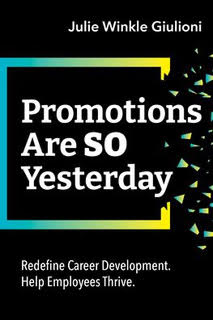Seventy percent of U.S. employees report being at least somewhat likely to leave their current employer for another with a reputation for investing in employee learning and development, according to a Harris Polls study and as called out in the new book, Promotions Are So Yesterday: Redefine Career Development. Help Employees Thrive, by Julie Winkle Giulioni.
“Career development, growth, and learning are among the top reasons employees accept, remain in, and/or leave a role,” states Winkle Gioulioni. And, “if you take nothing else from my book, I hope it’s this: The time-honored tradition of defining career development in terms of promotions, moves, or title changes is dead,” adds Winkle Giulioni.
Therefore, she recommends leaders consider that there are seven other dimensions that can be developed through one’s career. “And when employees take off their blinders and become aware of the other viable and valuable ways they can grow, my research suggests that the promotion climb suddenly becomes a lot less interesting,” says Winkle Giulioni.
The seven
dimensions are:
- Contribution
- Competence
- Connection
- Confidence
- Challenge
- Contentment
- Choice
The book provides you checklists, discussion questions, tools and templates to use with employees, all of which will make it easier for you – and them – to take action. As a leader, by using all these elements from the book, you will have infinitely more ways to support employee growth through a multidimensional view of their careers – especially when promotions are not readily available.
Julie Winkle Giulioni
Today, Winkle Giulioni shares these insights with us.
Question: How has the pandemic made your book more relevant?
Winkle Giulioni: The past two years of dealing with the pandemic has caused people to rethink so many aspects of their lives – including careers. The great resignation, re-evaluation, or re-shuffle (or whatever you’d like to call it) is in part evidence of this current reality.
During this time, many of us found ourselves reflecting on our priorities and what we really want from life. Some who were offered the opportunity to work from home had a visceral experience of what they’d been missing while at work. Others found themselves facing heart-wrenching decisions related to the health of their families.
All of this has caused employees to recognize that the old, artificial yardstick of career success – the promotion or title – may not be what will best serve them, their families, or their long-term happiness. News stories abound featuring professionals who’ve left prestigious, high-profile jobs to do something that offers greater meaning. Everyone knows someone who enjoyed unparalleled productivity and flexibility working remotely and is resisting returning to the office. And work-life balance continues to garner more and more attention.
With so many of us redefining what careers mean and reshaping our relationship with work, Promotions Are So Yesterday, takes on greater relevance. Leaders and managers must be prepared to deliver a new employee experience, one that allows people to develop in ways that are important to them. And this book offers a roadmap for doing just that.
Question: How can leaders overcome challenges of more employees working from home as those leaders implement your book's advice for creating a multidimensional career framework?
Winkle Giulioni: From the beginning of the pandemic, I’ve advised leaders that career conversations are a powerful tool to helping employees remain connected to the leader, their work, and the organization. When we remind employees that they are valued, seen as contributors, and worthy of investment, this triggers engagement, tapping discretionary effort, and building long-term loyalty.
So, I see using the advice from, Promotions Are So Yesterday, with remote employees as a powerful strategy leaders can use to bridge the distance and develop a deeper shared understanding of the kind of development that will resonate for employees.
They can do this by including ‘Career’ as a standard agenda item during every one-on-one meeting. They can encourage employees to complete the online Multidimensional Career Self-Assessment and then use the results as a foundation for more meaningful conversations. And they can enhance cohesion within remote teams by encouraging employees to share their development priorities with each other and offer mutual support. (And the resulting benefits of this sort of trust and teamwork will radiate into every other aspect of the team’s interactions and performance).
Question: Of the
seven dimensions which one is the most challenging for leaders to
perform and why?
Winkle Giulioni: This really depends upon the leader. Human beings tend to gravitate toward what’s comfortable and familiar. So, if my priority right now is developing greater confidence, I’ll likely find it easier to recognize and support employees with a similar focus. Conversely, if I have no need to grow my current level of challenge, I might not see the opportunities to help others with that.
That said, the development dimension of choice seems to be the most vexing for managers and leaders. It’s easy to focus on the autonomy or decision-making authority that a leader CAN’T offer others. But in most cases, there’s far more opportunity for choice than many of us recognize. Finding those areas where people can exercise greater control over how they do their work offers employees a greater sense of agency – and helps them develop their careers without the need for promotions, moves, or a new title.
Winkle Giulioni is a champion for workplace growth and development and helps executives and leaders optimize talent and potential within their organizations. As one of Inc. Magazine’s Top 100 speakers, she is also a regular columnist for Training Industry Magazine and SmartBrief and contributes articles on leadership, career development, and workplace trends to numerous publications including, The Economist.
Thank
you to the book’s publisher for sending me an advance copy of the book.


ReplyDeleteThis post was packed with helpful details. I’m definitely bookmarking it for future reference.
Emotional intelligence coaching